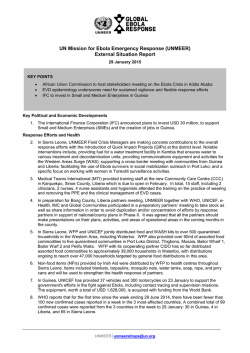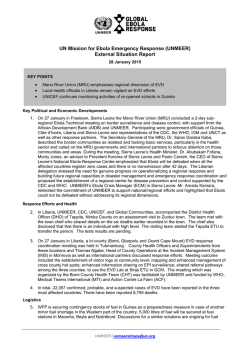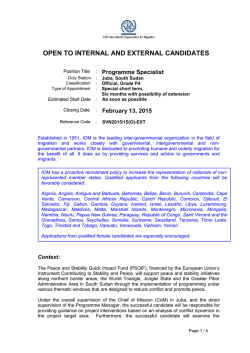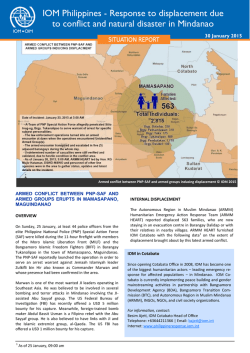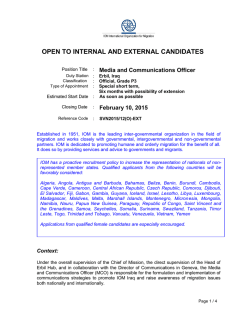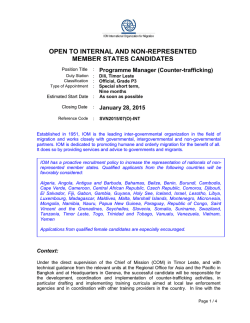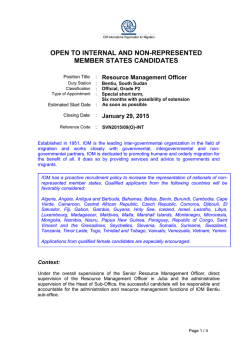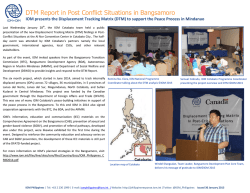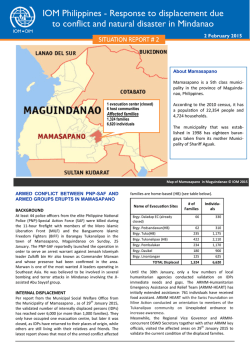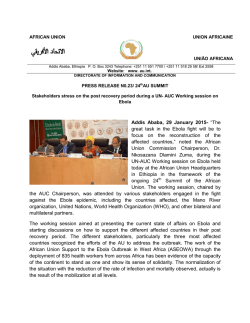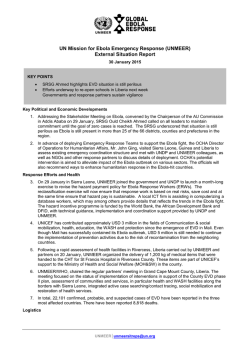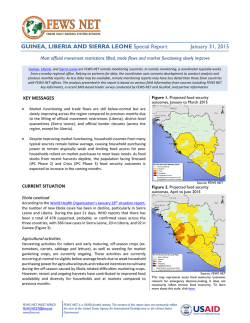
Sierra Leone - International Organization for Migration
IOM Sierra Leone Ebola Response SITUATION REPORT | Issue 9 | 25-31 January 2015 Banner at the National Training Academy. Over 2500 health professionals have been trained since 01 December 2014. © IOM SL 2015 SITUATION OVERVIEW Case incidence continues to fall in Sierra Leone, with a halving time of 2.7 weeks in Sierra Leone. Sierra Leone’s 117 new confirmed cases reported 14 - 20 January 2015, is down from 184 the previous week and 248 the week before that; a fourth straight week of fewer cases as reported by WHO on 21 January. Sierra Leone’s western districts continue to see the most intense transmission. The capital, Freetown, reported 30 new confirmed cases, and the neighboring districts of Port Loko and Western Rural reported 31 and 17 new confirmed cases respectively, in the 7 days to 18 January. A total of 10 out of 14 districts in Sierra Leone reported new confirmed cases in the latest reporting period. Kailahun, which borders Gueckedou in Guinea, has reported no confirmed cases for 37 days. WEEKLY HIGHLIGHTS On January 26-27 IOM Sierra Leone attended the Mano River Union Technical Meeting on Border Surveillance and Disease Control. On January 29-30 IOM Sierra Leone attended the UNMEER and UN system’s EVD Survivor Support Meeting in Dakar, Senegal. IOM’s Emergency Care Kit distribution continues in the Western Area wards of John Thorpe, Kontolloh, Rokel and Thunderhill . On January 28-29 one 4-person mobile training team was deployed to Bo District to train 11 swab collectors. This marks the beginning of the Mobile Training segment of the Training Academy. IOM’s Border Management team, US Centers for Disease Prevention and Control and the Sierra Leone Aviation Authority delivered a joint action plan to the National Ebola Response Center on 30 January for strengthening health systems at Lungi Airport. 1 IOM Sierra Leone Ebola Response Situation Report | Issue 9 | 25-31 January 2015 National Ebola Training Academy & Mobile Training Operational Highlights 1x 3+2 day Clinical Infection Prevention & Control (IPC) simulated patient training was held for Hastings ETU medical staff, medical teams from Blue Shield Hospital and Partners in Health USA and a UNDP Medical Services team. Delivery of 2 one day mobile trainings for swab collector lab technicians in Bo District (see more on page 4 of this situation report) 2 courses of 3 day basic IPC 2 day Training of Trainers for all IPC trainers to implement recent amendments. Curriculum Development A 2-day Training of Trainers (ToT) was held for all IPC trainers. Day one focused on review of the recent changes to the IPC curriculum and efficient ways to communicate to the broad range of nationalities of trainees served by the Academy. Day two featured a variety of participatory exercises aimed at harmonizing methods among all trainers. WHO’s IPC Expert visited the ToT to field questions and to observe the implementation of the IPC module with the added practical components. WHO clinical coordinator presented the IPC module within the 3+2 day, week long clinical course. The mobile training provided to the Bo burial team swab collectors revealed the importance and value Governance Development The second Academy Board of Governors meeting took place with attendance by the Ministry of Health, the Sierra Leone Armed Forces, the United Nations Mission for Ebola Emergency Response, World Health Organisation, UK Department for International Development, King’s Sierra Leone Partnership, IOM, and the Sierra Leone College of Medi- Swab collectors receive IPC training at the Bo District Ebola Response Center under IOM’s new Mobile Training Project © IOM 2015 of post deployment training as it allows for reinforcement of classroom and practical learning and real time corrections and adjustments. It also provided opportunities for trainers to develop a better understanding of the trainees’ situation on the ground— availability of essential materials and collaborative agencies and partners that influence their work. cine and Allied Health Sciences. Board members expressed interest in reviewing more information specific to numbers of trainees over the past 2 months, cadres, percentage of trainees deployed and locations deployed to within the IOM Academy database. Cumulative Training Academy operational data for 01 December 2014– 31 January 2015 (weekly number in brackets) Course Name Number of Total number of Total number of Cumulative courses run National students International Students Total 3 day Ebola clinician IPC 6 (1) 74 (2) 219 (42) 337 2 day simulated patient 1 day Ebola clinical IPC 4 (0) 26 45 (14) 85 2 day simulated patient 1 day clinical 2 25 41 66 augmentation 3 day basic IPC/PPE 24 (2) 1937 (122) 11 (0) 2070 Mobile Training I day 2 11 0 11 IPC Total 41 (5) 2197 (135) 372 (67) 2569 2 IOM Sierra Leone Ebola Response Situation Report | Issue 9 | 25-31 January 2015 Distribution of Emergency Interim Care Packages for suspected Ebola cases IOM's implementing partner, Oxfam, continues interim home care kit distribution through their community-based active case finding activities in four wards in the Western Area, John Thorpe, Kontolloh, Thunderhill, and Rokel communities. ACF’s liaison officer began working at the Western Area Command Centre on 19 January 2015 and will focus on liaising with the Case Management team at the Ebola Command to ensure that all suspected cases in the areas of coverage are provided with an interim care kit. In addition, the liaison officer will work together with the Ebola Command to tailor the project implementation to the evolving demands of the response and the epidemiological realities on the ground. Oxfam teams are continuing to cascade their training of Community Health Care supervisors and CHC team members in Port Loko and Bombali Districts to prepare for project implementation. Technical Meeting on EVD Survivor Support The UNMEER and Regional UN system in West and Central Africa held a Consultative Meeting on Programme Planning and Support to Ebola Survivors Workshop from the 29 -30 January 2015 at the UNICEF West & Central Africa Regional Office in Dakar, Senegal. The technical meeting’s aim was to develop a work plan with a set of defined outputs across a range of thematic areas for support of EVD survivors in the short and medium term. SierEVD survivor support meeting in Dakar © IOM ra Leone’s IOM team was represented at the meeting and had the opportunity to share experiences of survivorinclusive programs with the technical working group and the Sierra Leone country-specific working subgroup. IOM Sierra Leone discussed the support of survivors in the National Ebola Training Academy’s mock ETU and classroom-based learning; in the 12 January 2015 Border Management Emergency Simulation Exercise at Lungi Airport; and in IOM’s partners’ Community Health Worker programs. Health and Humanitarian Border Management On 30 January HHBM Project Manager Ben Potter delivered a joint IOM/CDC/Sierra Leone Aviation Authority (SLAA) presentation to the National Ebola Response Center and CEO Paolo Conteh. The team briefed the audience on the current health security of Lungi Airport. After detailing the achievements since the last briefing almost one month ago, outstanding gaps were highlighted. SLAA concluded the presentation by setting out the joint plan of action for moving the health defense system forward. The plan of action centered on 4 areas: 1) Strengthening airport management capabilities and structures; 2) Continuous training of airport staff through monthly Health Emergency Exercises, weekly tabletop exercises for management teams, and specialist training for ambulance workers, health screeners and hygienists; 3) Reinforcing the airport infrastructure by developing a secondary screening site at the front gate; and 4) Developing better lines of communication between the receiving GOAL-run ETU and the airport management, for patients identified as needing a further medical evaluation prior to reentering the airport site. February is likely to see additional airlines resuming service to Sierra Leone. This is great news for everyone at the airport and Sierra Leone as a whole, and it is a testament to the enormous efforts taking place throughout the country to fight Ebola. Whilst remaining focused on the health security of the airport, the HHBM team played an important facilitation role at the Mano River Union conference last week in Freetown where the working groups con- HHBM Project Manager addressing the NERC © IOM 2015 sidered health issues at land border crossings. 3 IOM Sierra Leone Ebola Response Situation Report | Issue 9 | 25-31 January 2015 Mobile Training Kicks Off in Bo and more targeted trainings to ensure uniformity of standards, as issued by WHO, are necessary and will go far in strengthening responses to potential future outbreaks of Ebola, protection of patients and health care workers and more general health care standards. On January 26-27 IOM Sierra Leone carried out a training of 11 swab collectors after a request from CDC/ WHO and the Ministry of Health at the District Ebola Response Center in Bo. This marks the beginning of decentralized trainings to be conducted cross-country in As case numbers decrease, IOM’s focus on centralized training in Freetown is slowly being shifted to a districtresponse to ongoing training and retraining needs on Ebola-centric Infection Prevention and Control by IOM. based approach in coordination with WHO. The IOM mobile training team was made up of 3 doctor trainers and the Training Coordinator from the National Training Academy in Freetown. The swab collectors who are laboratory technicians work in conjunction with burial teams in Bo. A sample taken from a corpse is analyzed in a local lab with a 12-hour turnaround time. If the sample returns an Ebola positive result contact tracing commences immediately to limit potential infections. As more knowledge of the disease has become available over the course of the outbreak training guidelines have changed and improved, thus retraining News Headlines (click links for story/video): How Ebola found fertile ground in Sierra Leone’s chaotic capital, National Geographic, 27 January In the beginning of September, there were 79 cases in the western region, including the capital. By the end of December, there were 2,766, a 35-fold increase. New Ebola cases per week fall under 100 for 1st time since June, Reuters, 29 January The number of new confirmed Ebola cases totaled 99 in the week to Jan. 25, the first time the weekly total has fallen below 100 since June 2014, the World Health Organization said on Thursday. Ebola outbreak: Virus mutating scientists warn, BBC News, 29 January Post-Ebola, AU plans pan-African CDC, Devex, 29 January 5-most promising innovations from the Ebola response, Devex, 29 January While the international response to the health crisis engulfing Guinea, Liberia and Sierra Leone continues, here are the five most promising ways to treat those affected by the current outbreak and prevent a similar one in the future. IOM Sierra Leone’s initiatives are supported by: For more information on IOM’s Sierra Leone activities please contact: IOM Department of Operations and Emergencies | [email protected] | IOM Sierra Leone Response | [email protected] | Public Information/Project Development | [email protected] Please find IOM Sierra Leone on Facebook at www.facebook.com/iomsierraleone 4
© Copyright 2026
